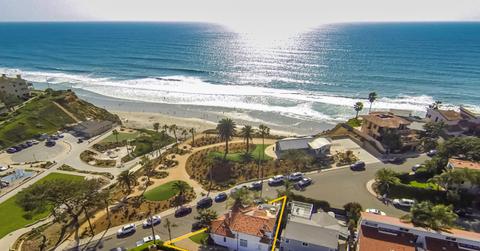This Beach Town Is Offering Residents An Energy Plan Run Entirely On Renewables
Solana Beach, California is known for being eco-friendly. Now the city has taken a big step toward a clean energy future, by voting to give it's residents a clean-energy alternative to their current, traditional energy provider.
Updated May 22 2019, 9:37 a.m. ET
Solana Beach, California has long been known as a city interested in environmental innovation. It was one of the first U.S. cities to ban plastic shopping backs, public smoking, and styrofoam takeout containers. Now Solana Beach has taken yet another step toward a clean energy future, by voting to give its residents an alternative to their current energy provider.
The Solana Beach City Council voted 4-1 Wednesday to begin work on the creation of a CCA (Community Choice Aggregation) which could provide residents with clean energy via two private companies. The city has now entered the first of three phases in the building of the CCA, which means that there is still a long road ahead. Even so, the CCA could begin operating in as little as two years, if things go according to plan.
Residents of Solana Beach seemed enthusiastic about the city's new plan. More than a dozen citizens spoke in favor of the idea at the City Council meeting. Even the City Council's one dissenting member, Councilwoman Ginger Marshall, said that she supports renewable energy. Her issue with the city's plan centered around the idea of "adding another layer of government" as well as the potential costs and fees of the program.
How would the CCA work?
Because Solana Beach has only entered into the first phase of planning for their CCA, officials have stressed that there has been no cost to the city yet. The first phase is mainly for publicizing the program, establishing proper staff, and planning the implementation of later stages.
But once the CCA is up and running, residents will be automatically be included, with the option to opt out. Assuming they opt in they will pay the CCA for their energy, rather than their current provider (the San Diego Gas and Electric Co. owned by Sempra Energy). The CCA would be run by two private companies, The Energy Authority and Calpine Energy Solutions. But unlike SDG&E, the CCA will be a nonprofit entity with no shareholders, which means that rates for those opting in are almost guaranteed to be lower than those of SDG&E.
Residents will pay their energy bills the same way they always have, and the companies in charge of the CCA will receive monthly payments and fees based on the number of people who have opted in, as well as the amount of energy they purchase.
Why are CCAs better for the environment?
Solana Beach hasn't announced any solid plans for their CCA to provide new sources of energy, such as solar or wind energy, yet. But CCAs are still considered by activists to be great alternatives to traditional utility companies. This is because traditional utility companies tend to be big investors in coal, gas-burning plants and related resources. Therefore they are often locked in long-term commitments to fossil fuels. This means that such companies are more hesitant to switch to alternative fuels than a non-profit, government run CCA would be.
CCAs can choose to purchase resources that are cleaner and carbon free, which is great news for the environment, since carbon leads to the buildup of greenhouse gasses, which are responsible for climate change. The creation of CCAs is one way for California communities to stick to their state's mandated climate action plan, which is one of the most aggressive in the country.
How successful are CCAs?
Eight CCAs have been launched in cities around California since 2010, though several are still in the planning stages. According to leanenergyus.com, other CCAs currently operating in California are "offering their customers 20-50% more renewable energy than the incumbent utility at prices that are competitive and currently lower than the utility rates." The website also mentions that MCE and SCP, two California CCAs which are already up and running, "are also procuring and co-developing in-State and local renewable resources and offering specialized energy programs designed for their local service areas."
Although SDG&E recently set up a lobbying group to voice concerns about the “regulatory uncertainty” that CCAs face at the state’s Public Utilities Commission and the state Energy Commission, the citizens and lawmakers of Solana Beach seem confident about their CCAs chances for success. Speaking as a resident, former Solana Beach Councilman Peter Zahn said that CCAs are “a proven mechanism for reducing costs and increasing renewable energy." He added, "This really is innovation, and it’s effective and it’s proven."

